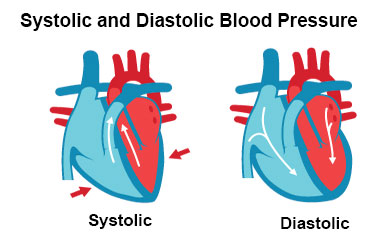
Blood Pressure Basics
What Is High Blood Pressure?

Blood pressure is the force of blood pushing against artery walls as it courses through the body. If the pressure gets too high, you could get a condition known as high blood pressure, or hypertension (the leading cause of stroke and heart attack).
Your arteries are tubes, like a garden hose. If the pressure is too great, it can damage the hose or even cause a bleeding stroke (where the fluid breaks through the walls and spills out). This is one way that high blood pressure can lead to life-threatening conditions such as heart disease and stroke.
You can find out your blood pressure during a routine doctor checkup, or even by taking your own blood pressure.
How Is Blood Pressure Measured?

The blood pressure reading includes two numbers: Systolic and Diastolic.
- The systolic number is the higher of the two. It is the pressure in your arteries when the heart is in the middle of the beat.
- The diastolic number is the lower of the two. It is the pressure within the arteries when the heart rests between beats.
All Over the Map
It changes by age:
A normal, healthy blood pressure is about 90/60 at birth. By the time you get to adulthood, it rises to about 120/80.
It changes by condition:
If you just exercised, did anything stressful, had an emotional event, or even just walked up the stairs, your blood pressure will read higher. This is totally normal, and no cause for alarm.
It changes by person, within person:
Blood pressure varies from person to person, and even from one area of your body to another.
When to Raise a Red Flag

Before you can raise a red flag, you have to know there's a problem. High blood pressure is not like the flu, where 1) you have symptoms and then 2) you go get the problem treated.
With high blood pressure, there are basically no symptoms until after you have a heart attack or your kidney fails. At that point, it's too late. That's why you need to get your arm in that cuff and get your reading taken regularly.
Why regularly?

Yes, blood pressure can spike at different times of the day, but when it remains consistently high, that's when you need to talk to your doctor about handling this with some form of treatment. When your heart is working against chronically high blood pressure, your heart has to struggle beyond its capacity. This can harm your blood vessels, brain, eyes, and kidneys. You need those things.
How High is Too High?
If you've had readings of 140/90 or above over at least two consecutive occasions, that is considered "high blood pressure." If you are over 60 years old, a high blood pressure reading is 150/90 or above.